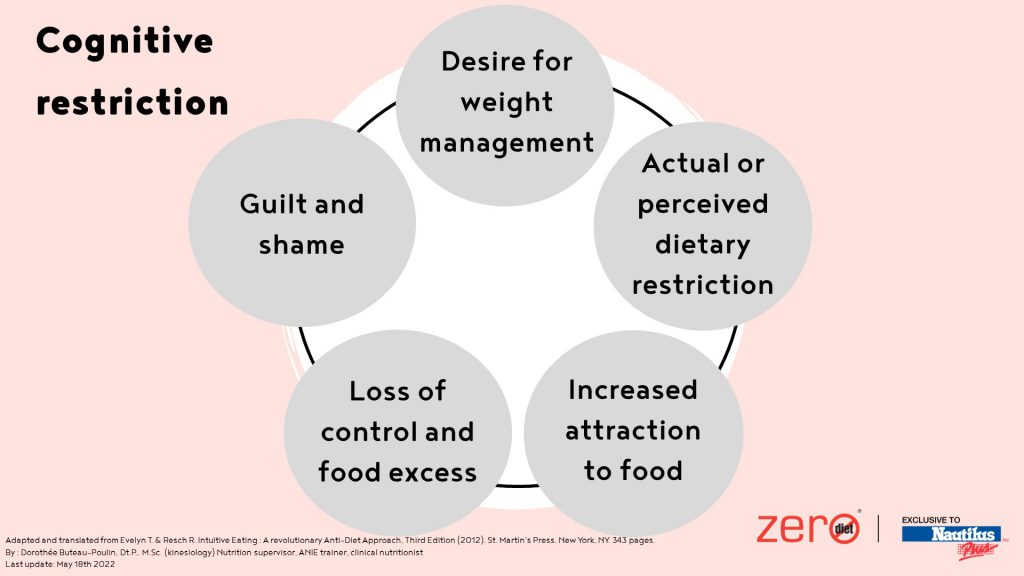
Nutrition during the Holiday Season: Why do we fear overeating?
December 1, 2022 - By Dorothée Buteau-Poulin
![]() 5 minutes
5 minutes
The holiday season is often synonymous with gatherings and celebrations with loved ones, but also with an abundance of food. While the abundance of food may bring joy to some, it can also bring anguish and guilt to others. When we know that almost half of the adults in Quebec are almost always watching their weight and counting calories, it is not at all surprising. So why do we fear overeating and how can we feel more confident about the abundance of food this holiday season?
Cognitive restriction: what is that?
Cognitive restriction is a complex psychological phenomenon that influences our eating behaviour. It is often the cause of overeating and the fear of food abundance, as is the case during the holiday season. Simply described, cognitive restriction is an intention or feeling to deprive oneself of food in quantity, frequency, or timing. One can also be eating the food in question AND be cognitively restricted. For example, this is when you eat chips and think “I shouldn’t buy more, I always end up eating the whole bag”, “I’ll have to go for a run to make up for it” or “there’s a reason you’re not losing weight, you have so little control”. The result? We often feel guilty and ashamed of what we’ve just done, we tell ourselves that we will get back on track and have more control, and so the cycle goes on!

(Re)Building confidence in the face of food abundance
Fortunately, it is possible to break free from the vicious cycle of cognitive restriction! The most effective solution is to work on the trigger: the desire for voluntary control over body weight. The desire to lose a few pounds or even more, as well as the desire to avoid gaining weight, are examples of triggers for the vicious cycle of cognitive restriction. However, it is not necessarily an easy or quick fix: it can seem like a daunting task and discourage us from attempting it. If this is your case, there are other solutions!
In fact, another solution is to list the foods that attract us the most. Then, circle the foods that you don’t allow yourself to eat as often or as much as you would like. Finally, choose one of these foods and begin to practice what is called habituation. This exercise consists of exposing yourself to the food in question on a continued basis and over an extended period. Yes, that means having it in the house ALL the time! It may seem scary at first, but as you persevere, the food loses its special value and you become desensitized to it. It will be much less appealing if it becomes a regular part of your eating environment, much like you lose interest in a lunch when you’ve eaten it 3 or 4 times in a week!
5 quick tips before the holidays
You may be thinking that this is all well and good, but you don’t have enough time to focus on it before the upcoming holiday season. Here are 5 quick tips to help you deal with the food binges with less anxiety and guilt.
- Choose your favourite foods and take the time to enjoy them
- Choose foods or dishes that you can’t find the rest of the year (e.g., your aunt’s meat pie, your cousin’s dessert, etc.) instead of the chips you can buy year-round at the grocery store
- Avoid being hungry at mealtime: you can eat more slowly, enjoy your food more and feel fuller.
- Don’t try to compensate for your “bad choices” by adding more “good choices” to your plate. You will probably eat more than you need to and feel uncomfortable after the meal.
- Think about dessert! If you have a sweet tooth and several tempting choices waiting for you, why not save room for dessert and eat less at the main meal? After all, a few meals with less protein and vegetables won’t cause you any health problems. Plus, your stomach will thank you for it!
- BONUS: Be kind to yourself, after all, it’s a time to celebrate with your loved ones!
In nutrition, as in other areas of life, receiving excellent advice does not guarantee success. The difficulty lies in putting this advice into action and, above all, in applying it consistently to our lifestyle. In addition, the relationship with the body and food can be very complex and involves an important emotional component. Do not hesitate to consult a nutritionist (and/or a psychologist) to guide and support you in this process.
Happy Holidays 😊
References :
Institut national de santé publique du Québec. Habitudes de vie, qualité du sommeil et préoccupation à l’égard du poids en contexte de COVID-19 : portrait de la situation et pistes d’action. April 2021. Accessed online: https://www.inspq.qc.ca/sites/default/files/publications/3133-habitudes-vie-sommeil-poids-covid-19.pdf (November 2, 2022).
Nutrition during the Holiday Season: Why do we fear overeating? is a post from Nautilus Plus. The Nautilus Plus blog aims to help people in their journey to fitness through articles on training, nutrition, motivation, exercise and healthy recipes.
Copyright © Nautilus Plus 2022

A session with a nutritionist will help you on your way!

Let's establish your nutritional goals together and get some expert advice!
Make an appointment
